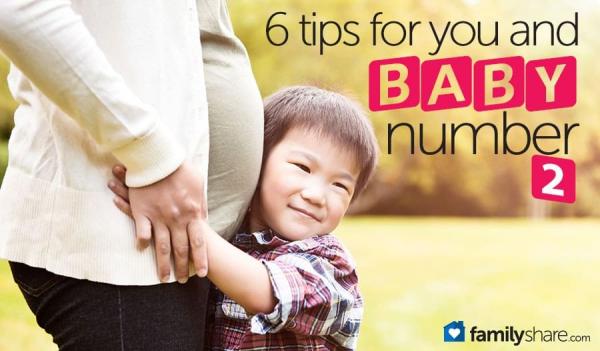
I still remember the excitement of welcoming my daughter, our second child, to our family. It wasn't until my last month of pregnancy that I started to picture the potential dilemmas and disasters that seemed inevitable with a new baby and a very busy toddler. What am I going to do when she needs to nurse, and my 3-year-old is screaming for attention? Or running out the front door? Or is taking Sharpie markers to my walls? What will he think of the new baby? How will he react to all the crying, pooping, feeding? How do I share my time and energy with both children when I'm running on four hours of broken sleep? It was then I realized I needed to make a plan for me and for my son. I knew if I waited until the baby was born, I'd be in survival-sleep-deprived-hormonal mode, and the chances of being diplomatic and calm with an energetic 3-year-old were fair. Or most likely not happening. Here are just a few things that will help both you and your child when you're expecting baby No. 2.
1. Get your little one involved in welcoming your newest addition
Depending on the age and emotional maturity of your child, do what you can to get him excited about the baby. Have him talk to her, ask for his opinion on names, tell him how excited you are for him to be a "big brother." Little things like that will help him feel included and not forgotten in preparing for baby's arrival.
2. Give your child a special gift
Your child will see a lot of presents pouring in for the new baby - especially if the baby is of the opposite gender. Make sure you have a little present or two stashed away just for your child, so she feels like the baby isn't already stealing the spotlight. An ideal time would be after a baby shower as that is when she will see many boxes of new clothes and toys around the house. Another good time might be right after the baby makes his début. A small toy or book can help your older child feel involved and remembered during the craziness.
3. For little ones, make the transition to a toddler bed earlier than later
Seeing the crib come down and transferred to the baby's room can be rough on a child. After all, that's the bed they have known and slept in since birth. Be sensitive and wise about this new milestone. If you give him ample time to adjust to and love his new bed (whilst giving him lots of praise for being a "big boy"), you might discover fewer or no tears when he sees your new babe in the crib.
4. Have a list of activities ready to keep little hands busy
What does your child like to do that will keep him occupied while you nurse the baby, change a diaper, or throw in a load of laundry? Puzzles, letter or shape hunts, building blocks, coloring, playing dress-up, building a fort or reading books are great options to keep your child engaged while you tend to the baby's needs. Also allowing him to watch a cartoon or favorite program can be a saving grace for a sleep-deprived mama. Click here for more unique activities for young children.
5. Schedule one-on-one time
Newborns take a lot of work, time and attention. Even if you have an easy-going older child, you can be sure it will take some time to get used to not having mommy all to herself. As much as you can, make time just for her. It could be as simple as 20 minutes of reading together while your baby cat naps or an hour at the park when your spouse is home to take care of the baby. With all the new changes in the home, uninterrupted one-on-one time will help your child feel valued and not forgotten. Hopefully, this will result in less resentment toward the baby and fewer tantrums directed at you.
6. Try to recruit as much help as you can
Have your hubby take adequate time off work to help out with this new family member. Ask your mom or mom-in-law for her help around the house or with the older child. If trusted neighbors or friends are dying for some alone time with junior, take them up on their offers. Bottom line: don't try to do it all on your own, especially if you have family or friends able and willing to help. Remember, when you add one more child to your family, napping when the baby naps is no longer an option. Accept and welcome any extra help, particularly during those first few months when you're in exhaustion mode.
Bringing home a baby with a little one at home can feel overwhelming. Just remember to keep a list of activities for your older child and schedule one-on-one time with her. Also, don't be afraid to ask for or accept help. Above all, keep in mind that many have been where you are and have lived to tell about it. Things will get better and you will get more sleep. Finally, with a little preparation and some patience your oldest will learn to love the newfound role of being a big sister or brother.

